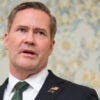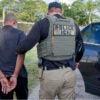A Texas state senator who championed legislation to establish election audits in the Lone Star State says he anticipates such audits will become as commonplace and accepted as voter ID.
When he traveled to Washington in 2006 to testify in support of voter ID before the House Administration Committee, the hearing room filled up “because it was a flashpoint,” state Sen. Paul Bettencourt recalled.
“Now, everybody knows that photo ID does not stop turnout. In fact, there is no case in the United States that I know of where a state that has adopted it has had a problem with turnout,” Bettencourt, a Republican, said Thursday during a panel discussion at The Heritage Foundation. (The Daily Signal is Heritage’s multimedia news organization.)
The Daily Signal depends on the support of readers like you. Donate now
“This [election] audit situation is the same thing,” the Texas lawmaker said. “In the future, it’s going to be commonplace and everybody is going to agree with it, but it’s going to take time to get there.”
In 2021, the Texas Legislature passed an election law reform that included establishing a forensic audit division in the Texas Secretary of State’s Office, which oversees elections. Some liberal groups, including the Brennan Center for Justice, have contended that audits will discourage voting and “sabotage” elections.
However, just as auditing is commonplace to ensure confidence in the finances of a business, all states should audit voter registration, voting, and vote-tabulation processes and systems to ensure public confidence, panelists at the Heritage event said.
The difference between financial audits for a business and an election is that voting is by definition political and thus it would be difficult to build bipartisan trust, said Charles “Cully” Stimson, deputy director of Heritage’s Meese Center for Legal and Judicial Studies and moderator of the event, titled “It’s Time to Audit: Every State, Every Election.”
“I’m sure there are people watching this saying, ‘Oh, this is a Republican state. These are Republicans who are trying to audit and kick Democrats out,’ or ‘People should be allowed to vote,’” Stimson said, adding:
Similarly, if there was an audit in Chicago of the votes, some Republicans would say, ‘You can’t trust that because this is the fox guarding the henhouse.’ How do we convince both sides they are wrong and move it to the point where businesspeople just view it as this is part of business and increasing the confidence that the vote was done right?
Chad Ennis, director of the forensic audit division in Texas Secretary of State John Scott’s office, noted that today Republicans are more favorable to audits after the 2020 presidential election.
But after both the 2000 and 2016 presidential elections, Ennis said, Democrats said the election was stolen.
“What needs to happen is the pendulum needs to swing. Both sides need to go through a round of losses, then I think everyone can come around to it, because it’s something that needs to be done,” Ennis said. “Whether you are left, right or center, you want a fair process.”
The auditor must have professional standards and principles as well as professional staff to ensure confidence from both sides, said Hans von Spakovsky, manager of Heritage’s Election Law Reform Initiative.
Election audits could become an industry if enough states begin to do them, von Spakovsky said.
“The big problem in this area right now is not a problem in the business area, because audits in the business area have been done for so long and became so standard. There is a huge group of experienced auditors, independent auditors that can be hired by companies and organizations to do their audit,” he said.
Nothing like that currently exists for election auditors, von Spakovsky said.
“But if states start requiring the kind of audits that we are all talking about, that industry is quickly going to establish itself because all of these election officials—experienced people around the country as they start to retire or leave what they are doing—if there is a business opportunity there, they are going to start these auditing firms,” von Spakovsky said.
In the near term, Texas’ Bettencourt said his state’s election audits were different than the one in Arizona done by a private cybersecurity firm in 2021. In Texas, he said, state officials in the forensic audit division conduct the reviews.
“From a policymaker perspective, we started with the concept that it would be better to have a professional do the audit, in this case, someone from the secretary of state’s forensic audit division,” Bettencourt said, adding:
If you hired a third-party auditing firm to do it, they don’t really understand the regulations. … You’ve got to get the core function of the work by people who have done the work. Otherwise, you don’t get people who can recognize the obvious. If you don’t know what needs to be fixed, or what the measurement is, you can’t do it.
Have an opinion about this article? To sound off, please email letters@DailySignal.com and we’ll consider publishing your edited remarks in our regular “We Hear You” feature. Remember to include the url or headline of the article plus your name and town and/or state.





























